Struggling to stay calm when you’re triggered? Learn how to respond with grace when you’re angry by practicing one powerful habit that brings peace before conflict starts. Based on Proverbs 15:1.
How to Respond Instead of React When You’re Triggered
Have you ever walked away from a conversation thinking, “Why did I say that?” Maybe it was the heat of the moment or a well-worn reaction that rose too fast to stop. That sting of regret can settle in quick.
If you’ve ever wished for a do-over or felt the weight of your words after they slipped out, welcome to the club.
Oops, I Did It Again… Reacting Instead of Responding with Grace
I had one of those moments just last night during a conversation with my husband.
Our dryer has been on the fritz, and we’ve been waiting weeks for the repair—so I’ve gotten behind on laundry. I was standing there trying to figure out where to hang the wet clothes when he asked why I hadn’t washed his towel.
And I didn’t respond very well.
I didn’t mean to, but I let frustration lead. I was Miss Snippy-Snip—sharp tone, quick reply—and just like that, we were in a moment of tension. We worked it out (no worries), but it reminded me how quickly conflict can spark when we react instead of respond.
We’ve all had those times when the words fly out before our brain catches up—when we wish we could hit rewind and say it differently.
That little laundry moment was no big deal—but it was a reminder. A small spark of stress can stir up conflict fast, but the pressure is higher, the stakes feel heavier.
Let me take you back to a harder moment. One that still stings.
What Happens When Stress Speaks Louder Than Grace
A few years ago, I was an editor for a ministry—juggling multiple projects, tight deadlines, and learning everything the hard way by trial and error. I was stretched too thin but didn’t speak up. And then came one more assignment—important, but small in the big picture. The draft needed editing for an upcoming conference, and I didn’t have the bandwidth.
My own writing had slipped off the radar. I was trying to keep my head above water.
When a leader shared some last-minute feedback—things that should’ve been caught earlier—I let my stress get out in front of me. I fired off a quick email to the writer, trying to clarify the problem and fix it fast.
But my tone missed the mark. It came across harsher and more critical than I intended.
I meant to clarify—but I ended up wounding.
I apologized later. I took responsibility for my reaction, and the writer forgave me. But something shifted in that relationship. The trust didn’t quite recover.
And that still weighs heavy on my heart.
I’ve often wondered… did my reaction discourage a gifted writer from pursue her craft? Did I let my stress become a stumbling block?
That experience taught me something I won’t forget:
When I don’t pause—don’t breathe, don’t pray—my stress can speak louder than the actual intentions of my heart.
And sometimes, the cost isn’t just an awkward conversation. It’s a quiet regret that lingers long after the moment is gone.
Finding Peace When You Feel Angry: The Power of a Gentle Response
We’re diving into one powerful habit from Proverbs 15:1 that helps us respond with grace when we feel triggered, rather than react with anger or frustration.
“A gentle answer turns away wrath, but a harsh word stirs up anger.” (Proverbs 15:1)
This isn’t just a wise saying—it’s a spiritual strategy. In Hebrew, the word “gentle” means soft or tender. And that phrase “turns away” literally means to change direction.
That means a peaceful response can redirect the emotional temperature of a moment before it escalates into full-blown conflict.
Let’s be honest. Harsh words often feel justified in the moment, but they rarely bear good fruit. Even when you’re right, a sharp or sarcastic tone can derail a conversation. Suddenly, it’s no longer about the issue at hand but the way it was said.
A gentle answer flows from a heart that’s already chosen peace.
Can you think of a time when your tone shifted the direction of a conversation—for better or worse?
Why We React Before We Think: Understanding the Brain’s Stress Response
Have you ever felt like, “Why do I keep reacting like this—even when I don’t want to?” There’s a reason, and it’s not because you’re weak or unspiritual. When we feel threatened, even emotionally, our brains and bodies kick into survival mode faster than we realize.
One of the first things that happens is an “amygdala hijack.” This is when your amygdala—the part of your brain responsible for processing emotions and detecting danger—takes over. It bypasses your rational thinking brain and reacts instantly to a perceived threat. Whether it’s a sharp tone, a passive-aggressive text, or a disrespectful glance, your brain goes into alert mode.
Psychologist Daniel Goleman coined the term amygdala hijack to describe this moment when your emotional brain overrides your thinking brain. It’s like a fire alarm going off inside you. Your nervous system releases stress hormones like adrenaline and cortisol, preparing you to fight, flee, or freeze. And in that moment, your prefrontal cortex—the part of your brain that helps you think clearly, reflect, and respond wisely—actually slows down. This makes it all to easy for your emotions to override your rational thinking.
If you’ve ever said something and immediately thought, I wasn’t even thinking straight, you probably weren’t—at least not with your whole brain. Your body was trying to protect you, even though the situation didn’t actually require a full-blown emergency response.
The good news? You’re not stuck in this pattern.
Because of neuroplasticity—your brain’s ability to rewire—you can learn new habits, and those new patterns can become your default over time. And that’s where this simple habit comes in: pause, breathe, pray, and let peace lead. It’s not just spiritual wisdom—it’s also good brain science.
The Pause That Makes a Difference
One of the most effective tools to manage stress in heated moments is the intentional pause. Here’s the habit:
Pause. Breathe. Pray. Let peace lead. Share on XIt sounds simple, but don’t underestimate its power.
- Pause: Even a 2-second pause gives your brain a chance to catch up and resets your nervous system.
- Breathe: A slow, deep breath sends a signal to your body that you’re safe. Inhale peace, exhale reaction.
- Pray: A simple breath prayer like “Jesus, be my peace” or “Spirit, slow me down” invites the Holy Spirit to lead.
- Let peace lead: Choose your words from a place of grounded calm rather than emotional reaction.
Every time you practice this habit, you’re training your brain and spirit to respond rather than react. It’s a holy pause that makes space for peace.
Don’t let pride, pressure, or panic lead your response. Let peace go first.
The Pause to Train Your Heart to Respond with Grace
This kind of response doesn’t happen by accident. It takes practice and intention. Here are a few simple ways to make this habit to pause, breathe, and pray part of your daily life:
- Visualize Peace Ahead of Time Think through situations that often trigger you. Imagine yourself choosing peace. This mental rehearsal begins forming a new, grace-filled habit.
- Create a Grounding Prayer Use a breath prayer you can call on in the moment. Some examples:
- Jesus, calm my heart.
- Lord, help me respond with grace.
- Spirit, give me Your words.
- Practice When Pressure is Low Use low-stress moments (like waiting in traffic) to rehearse the pause, breathe, pray rhythm.
- Set a Visual Reminder Place a sticky note on your mirror or dashboard that simply says, “Pause. Breathe. Pray.”
- Reflect Without Shame After a tough interaction, take time to reflect:
- What triggered me?
- What was happening inside me?
- How might I respond differently next time?
What one situation this week could you prepare for by deciding now to let peace go first?
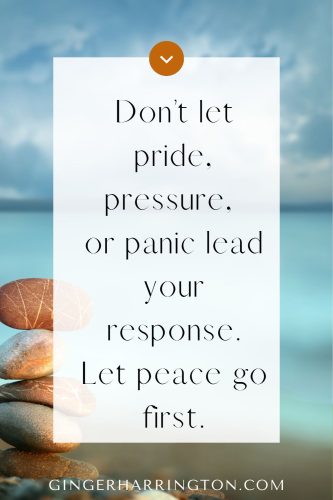
A Habit That Helps in the Moment
You’re not expected to get this perfect. But every time you pause, breath, and pray instead of reacting, you plant seeds of peace in your relationships—and in your soul.
Responding with peace won’t always feel natural, but it will always bear fruit.
This week, choose just one moment a day to pause, breathe, pray, and let peace go first. Watch what happens when you let the Prince of Peace shape your response.
Want more encouragement like this? Try listening to the episode while you go for a walk, do dishes, or drive. You might be surprised how personal a podcast can feel—like I’m right there talking with you. It’s an easy way to hear God’s truth while you move through your day. Click play and give it a try. If it’s your first listen, I’d love to hear what you think!
Want to Learn More About What’s Happening in Your Brain During Stress?
Understanding the science behind your stress response can help you practice peace with more compassion for yourself—and more success. These articles go deeper into topics like the amygdala hijack, nervous system regulation, and how simple habits like breathwork and mindful prayer help restore calm and clarity in tense moments.
- Daniel Goleman’s Website
- https://www.healthline.com/health/stress/amygdala-hijackhttps://www.simplypsychology.org/amygdala-hijack
- https://www.functionalneurohealth.com/post/how-your-breathing-reflects-the-state-of-your-nervous-system
Catch the Full Habits of Peace Series
Habits of Peace Episodes
-
-
- 40.Need a Little Peace? A Simple Habit to Notice When Peace is Missing
- 41.How to Pursue Peace God’s Way: A Simple Habit to Calm Your Soul
- 42.Peace is a Person: How to Embrace Calm in the Presence of Christ
- 43.How to Find Perfect Peace When You Feel Stressed (Isaiah 26:3)
- 44.One Peaceful Habit to Respond with Grace When You’re Angry
- 45.How to Let Go of Control and Let Peace Rule in Your Heart
- 46.Peacemaker vs Peacekeeper? How Jesus Calls Us to Respond to Conflict
- 47.Why Do I Keep Losing My Peace-Even When I’m Trying to Trust God?
- 48.How to Feed Your Soul and Grow Lasting Peace (Galatians 5:22)
- 49. Live in the Overflow: How to Experience God’s Peace Every Day (Romans 15:13)
-

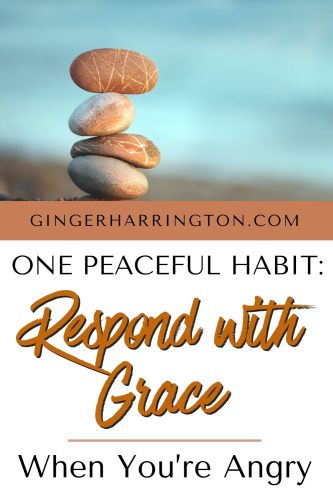
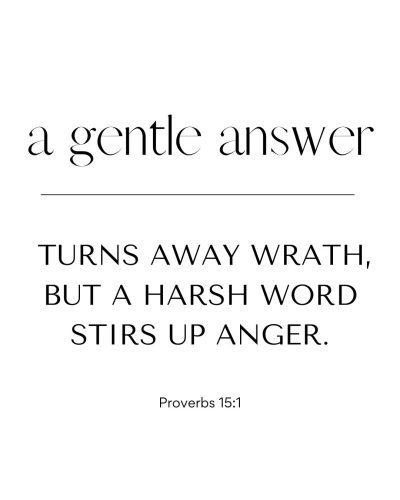

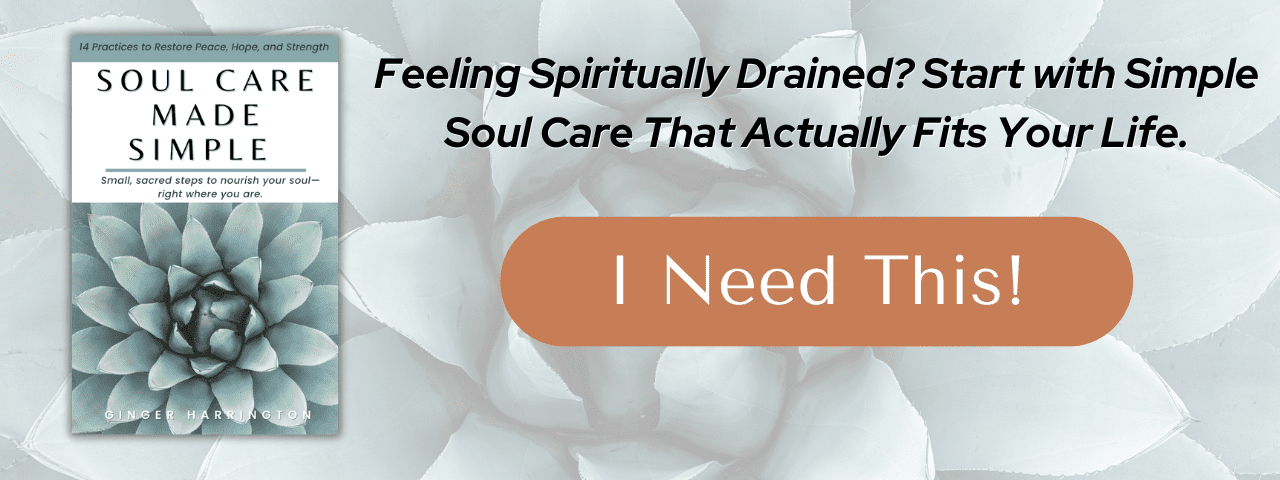
 So glad you're here. I help busy women—gals like you— build healthy habits for living well with biblical wisdom and practical steps to deepen your faith, increase your hope, and thrive in your purpose.
So glad you're here. I help busy women—gals like you— build healthy habits for living well with biblical wisdom and practical steps to deepen your faith, increase your hope, and thrive in your purpose.

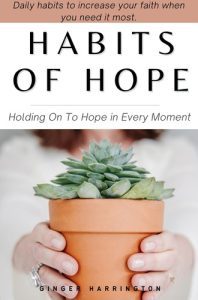


This is great, I definitely need this peace in my life. Simple but effective and powerful.
Thank you
Hi Elaine, I’m so glad you found the simplicity of this habit of peace to be helpful and powerful. I think it is easy to discount the simple steps because they seem too simple. However, if we follow Jesus’ teaching-he often pointed to the simple things in life to make the greatest lessons. May God work through this practice to help you pause, pray, and respond with grace.